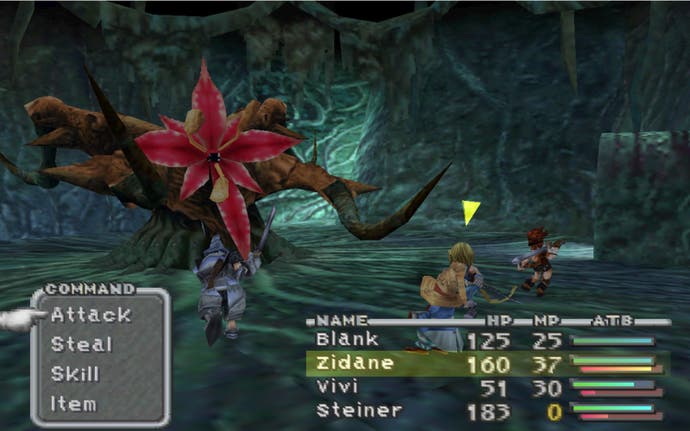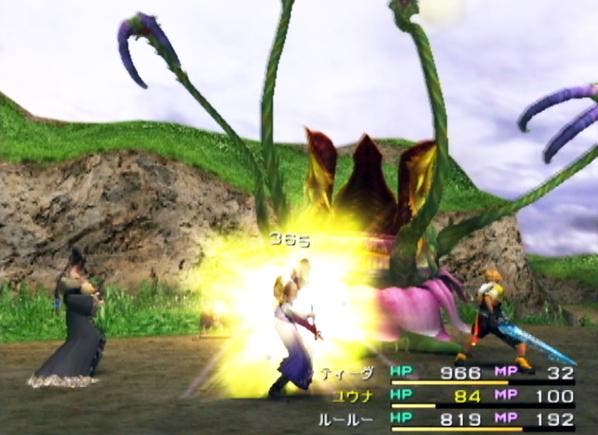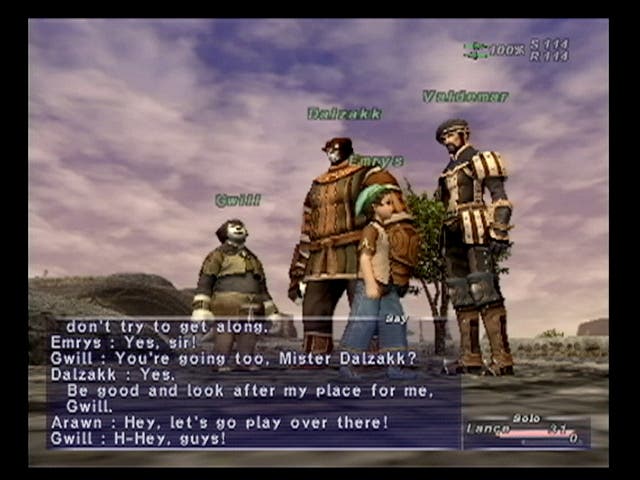Flight of Fantasy - Part 2
The Sony Years.
Final Fantasy IX
- Original System: Sony PlayStation
- Original release: July 7th, 2000
- Other versions: N/A
Three diversions - two into steam punk and one into high-school soap opera - was enough to see some sections of Final fandom clamouring for the series to return to simpler days of castles, knights, wide eyes and tights. Final Fantasy IX delivered: one wink and a nudge short of parody, the game skilfully walked a tightrope of pastiche to uncover what was clearly the spiritual successor to the very first Final Fantasy Famicom games.
Those disillusioned by the series' recent courting of mainstream and overly serious sensibilities were delighted by a game that featured more light-hearted scenarios and super-deformed characters. Initially Squaresoft had been concerned that such a visual and conceptual break from the previous games might alienate the millions of new fans and planned to have the game released as a separate title to the main lineage. In the end the decision was made to make the game the official 9th title in the series, but nevertheless the game didn't sell as well as either of the preceding games in any territory.
One of the most loved aspects of Final Fantasy IX is its score, the last Final Fantasy soundtrack to be composed exclusively by Nobuo Uematsu. It was to be his most prolific title featuring 110 separate pieces of music and, when Uematsu was last in the UK, he admitted to Eurogamer that this is his favourite soundtrack in the series.

Conversely, the game's card-based mini-game, a variation on Final Fantasy VIII's largely successful Triple Triad, was less well received. Barely explained, the complex battling game hid most of its rules and granted hardly any reward to the diligent player who unlocked its tightly clutched secrets.
Many of the more gameplay friendly innovations of the game, such as the "field icon" exclamation mark (which appeared over the lead character's head signalling a nearby item or sign) have been carried over into the new Final Fantasy XII game along with some plot echoes (such as the breach of a castle in the opening sections of both games). The game also deviates from the openly customisable character options of the previous two titles and returns to a job system strictly allocating characters to certain job tasks. Today Final Fantasy IX retains a lot of its charm and, thanks to its shunning of realism, has arguably aesthetically aged the best of the PSone titles. The likeable and enduring characters, especially the diminutive Black mage Vivi, make this an enjoyable revisit for the contemporary player.
Final Fantasy X
- Original System: Sony PlayStation 2
- Original release: July 19th, 2001
- Other versions: N/A
While not nearly as noticeable as the transition from Super Nintendo to PlayStation, Final Fantasy's debut on the PlayStation 2 saw the series' environments shift from pre-rendered backdrops to fully 3D vistas and heard previously silent characters employ voice acting. Also for the first time in the history of the series, mainstream critics started to turn on the franchise. Reviewers, even if they didn't explicitly score the game harshly, reported growing tired of the game's continued use of convention and some cited the game's return to bubblegum teen drama as a primary turn-off. The fans, on the other hand, were mostly suitably enamoured ensuring that this game became the first PS2 title to reach sales totals of 2 million and 4 million copies. Even more recently, in Famitsu's infamous poll, readers voted this Final Fantasy as not only the best of the series, but also as the best videogame ever.

In game, the PS2's processing power allowed some workaround shortcuts from earlier games to be ditched. Most notably the world map (a miniature representation of the expansive areas between locations) disappeared with the areas between town and dungeon integrated stylistically. Also, the levelling system was given a massive overhaul removing the traditional pre-determined statistic bonuses through battle experience in favour of an open and customisable boardgame style development grid. This was a big shift for players used to orthodox JRPG levelling but its reappearance (albeit redesigned and redeveloped) in the newest Final Fantasy XII game testifies to its effectiveness. Also, the ATB system, now firmly established as the series' core battle mechanic, was dropped in favour of a CTB (Conditional Turn-based Battle) system. Essentially just a fancy way of redefining 'turn-based', the CTB system saw the order in which characters could take moves predetermined by their speed ability.
Final Fantasy X divides opinion even today. As one of the first and best-dressed epic adventure games on the PS2, it was certainly responsible for bringing a new generation of fans to the JRPG. The impressive visual innovations that allowed cut-scenes to be represented in game (with rendering of facial expressions on characters achieved through motion capture) helped ensure Final Fantasy and Squaresoft were at the forefront of pioneering RPG visuals. But, nonetheless, the obvious and unsubtle voice acting, moody, pouting teenage protagonist Tidus, linear storyline and slightly embarrassing future sports theme (one of your team is a 'Blitzball' player) alienated as many fans as the technical posing won.
Final Fantasy XI
- Original System: Sony PlayStation 2
- Original release: May 16th, 2002
- Other versions: Microsoft Windows, Xbox 360
The decision to turn the next mainstream Final Fantasy release into an MMORPG (Massively Multi-Player Online RPG) was by far the bravest move Square made with the series. It was a bold choice that could have horribly backfired, as evidenced by the announcement's frosty reception from fans (especially in Japan where the MMORPG was far less popular than in the west at the time). However, as the trickle of game details turned into a tide, public opinion seemed to shift and gamers warmed to the idea of a sprawling fully functioning Final Fantasy theme park in which to sink a second life.

In reality, the game predictably follows the template of MMORPGs far closer than it does that of Final Fantasys past. A kind of redressed Everquest featuring Chocobos, Moogles and FF character classes for decoration, the game took a violent but necessary diversion from the JRPG format.
Set in the world of Vana'Diel new players were assigned to one of 32 server worlds (each identical in form and function but enjoying its own user base of players) and charged with creating a character that could be viewed in either first or third perspective. From there players picked a character class (which could be changed at any time) and one of the four nations of Vana'Diel to be birthed in, before setting about carving out an existence within the expansive framework.
By January 2004 over a million characters were being played in the game and, prior to the release of World of Warcraft, Final Fantasy XI was the most popular and well-subscribed of all monthly paying MMORPGs.
The game was originally released for PS2 but required the expensive HDD add-on for it to work. As a result it was ported to the PC platform before, earlier this year finding its way onto the 360 making it the first ever cross platform MMORPG. The decision to bring the game to 360 was actually a canny one, despite its tardiness. Microsoft gained a quintessentially Japanese IP, something the company has traditionally struggled to attract while also presenting a genre long promised for the original Xbox but never delivered. For Square-Enix it helped reinvigorate a world which had recently lost many inhabitants to newer, brighter, younger universes, helping continue to provide revenue where other streams of income from similarly aged games have long since dried up.
In the face of new competition Final Fantasy XI is showing its age. It was never going to be the most accessible title in the series: players had to have that rarest combination of luxuries all MMORPGs require: an abundance of free time and the patience to wrestle with settling into a world of complicated terminology, in-knowledge and often disparaging or unhelpful higher-level players. However, the lessons learnt (especially those in the battle system) have clearly gone on to inform Final Fantasy XII and made it all the better a game for it. While perhaps it's a little too late to recommend launching a career in a world in the midst of its winter years, the series would have been all the poorer without it.
Final Fantasy XII is due out in the US on 31st October and in Europe in early 2007. You can expect our full appraisal of the game imminently. If any of the views represented in this article have affected you, sit down, take a deep breath and maybe pop outside for some fresh air. Don't worry; the world will still be there after all. Always remember, the views expressed in this article are Eurogamer's own and do not necessarily represent the general views of Final Fantasy fandom, although, if we're honest about it, we really do think ours are the right ones.
